 Focus Question: What are the tasks which you need to let go of and have others complete? Description Following up on last week’s focus on delegation, what do you need to say no to? Saying no is just as powerful as saying yes. Activity Look back to your past two weeks of exercises – around delegation and commitment. What are the things you rated as a 5 or less? These are likely things that you need to say no to. What would shift them to a YES, of course or a higher rating? Best, Jennifer Jennifer Britton
Co-host of the Remote Pathways Podcast Potentials Realized – Coaching, Training and Consulting Services for remote teams, leaders and professionals Check out the most recent Remote Pathways Podcast Episode, where we explore the people, places and processes of exceptional remote work. You can listen to the latest episode here, or on your favorite podcast player.
0 Comments
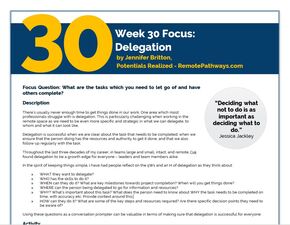 Focus Question: What are the tasks which you need to let go of and have others complete? Description There’s usually never enough time to get things done in our work. One area which most professionals struggle with is delegation. This is particularly challenging when working in the remote space as we need to be even more specific and strategic in what we can delegate, to whom and what it can look like. Delegation is successful when we are clear about the task that needs to be completed, when we ensure that the person doing has the resources and authority to get it done, and that we also follow up regularly with the task. Throughout the last three decades of my career, in teams large and small, intact, and remote, I’ve found delegation to be a growth edge for everyone – leaders and team members alike. In the spirit of keeping things simple, I have had people reflect on the 5Ws and an H of delegation as they think about:
Activity Today I am inviting you to take stock of all the things that are on your plate. As you consider past focus areas like the 80/20 Rule, what do you notice about where you are getting your impact and results in your work? You may recall that the 80/20 Rule – also known as Pareto’s Principle - indicates that we tend to get 80% of our impact from approximately 20% of our efforts. Key Tasks I need to do (or delegate): Identify one or two tasks you would consider delegating. Using the following chart, work through the associated questions: Best wishes, Jennifer Jennifer Britton
Co-host of the Remote Pathways Podcast Potentials Realized – Coaching, Training and Consulting Services for remote teams, leaders and professionals Check out the most recent Remote Pathways Podcast Episode, where we explore the people, places and processes of exceptional remote work. You can listen to the latest episode here, or on your favorite podcast player.  Focus Question: What are you committed to as a team? Description What are you committed to, no matter what? Teams are as strong as their weakest link. What are you committed to no matter what? Activity As a team consider what you are committed to doing, completing, starting this month. On a scale of 1-10, how committed are you really? What’s a 10 – ABSOLUTELY! What’s a 1 – Not really… Be ruthless with your commitments. What do you also need to say no to? All the best! Jennifer Jennifer Britton
Co-host of the Remote Pathways Podcast Potentials Realized – Coaching, Training and Consulting Services for remote teams, leaders and professionals Check out the most recent Remote Pathways Podcast Episode, where we explore the people, places and processes of exceptional remote work. You can listen to the latest episode here, or on your favorite podcast player. 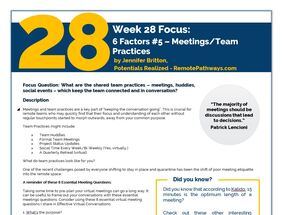 Focus Question: What are the shared team practices – meetings, huddles, social events – which keep the team connected and in conversation? Description Meetings and team practices are a key part of “keeping the conversation going”. This is crucial for remote teams who may quickly find that their focus and understanding of each other without regular touchpoints started to morph outwards, away from your common purpose. Team Practices might include:
What do team practices look like for you? One of the recent challenges posed by everyone shifting to stay in place and quarantine has been the shift of poor meeting etiquette into the remote space. A reminder of these 8 Essential Meeting Questions: Taking some time to pre-plan your virtual meetings can go a long way. It can be useful to frame out your conversations with these essential meetings questions. Consider using these 8 essential virtual meeting questions I share in Effective Virtual Conversations: 1. What’s the purpose? 2. What takeaways do we want? 3. Who needs to be on the call? 4. What preparation is needed for us to be most effective in the meeting? 5. What pace to do we want in order to keep it engaging? 6. What will help keep the focus? 7. What’s absolutely essential? (Versus what will be nice to cover or where can people go for more information around topics?) 8. What follow up might be required? (Excerpt: Effective Virtual Conversations, Britton, page 304, 2017) 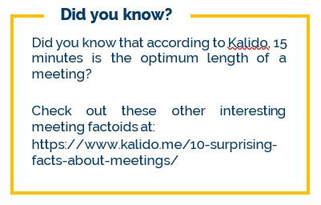 Activity Take stock of the team practices you use. What’s important to note? For more on this topic check out Chapter 9 of Effective Virtual Conversations on Meetings in the Virtual Space. Wishing you the best, Jennifer Jennifer Britton
Co-host of the Remote Pathways Podcast Potentials Realized – Coaching, Training and Consulting Services for remote teams, leaders and professionals Check out the most recent Remote Pathways Podcast Episode, where we explore the people, places and processes of exceptional remote work. You can listen to the latest episode here, or on your favorite podcast player.  Focus Question: What have you achieved so far this year? Description What a year! This week you are encouraged to take stock of what you have been working on and achieving this year. I’m going to borrow from last year’s mid-point check in which I shared as part of the 52 Weeks PDT series: This week you are encouraged to block off time to take stock of your achievements. First, review your annual plan. You may want to include some information around these questions:
Creating intentional pause points is an important part of any coaching and learning process. Being able to stop and reflect is also critical for business success. While we can keep on doing, are we doing the right things which have impact? What is working and what is not? This is the premise of the Virtual Retreats I host throughout the year in the PlanDoTrack series, as well as the month end reflection and monthly planning hacks.  Activity Use this as a time to focus in on what you have achieved in the first half of the year. Questions you might want to reflect on are: 1. What's important about achieving or completing this goal? (Coaching Note: As we know as coaches, it can be useful to reconnect with the 30,000-foot view and WHY the issues are important. As you step back - or step up - to look at this, what new energy and ideas are generated?) 2. What is the quickest way to achieve it? What's another way? And another way? (Coaching note: as we often see, generating alternative solutions can be invaluable and spur us on to more complete solutions.) 3. What shiny, red objects have shown up? Which are causing a distraction? 4. What's most important to you in your business right now? 5. Who can provide the support and resources you need to be successful? 6. What do you need to say NO to in order to focus on your goal? 7. When did you last pause to take stock (and TRACK) where things were at? 8. What's going to create some momentum for you? 9. What are you doing to note, and celebrate, milestones (and learning) along the way? Best, Jennifer These were questions I included in September 2018: https://www.coachingbusinessbuilder.com/blog/less-than-100-days-to-go-in-2018-what-do-you-want-to-focus-on Jennifer Britton
Co-host of the Remote Pathways Podcast Potentials Realized – Coaching, Training and Consulting Services for remote teams, leaders and professionals Check out the most recent Remote Pathways Podcast Episode, where we explore the people, places and processes of exceptional remote work. You can listen to the latest episode here, or on your favorite podcast player. 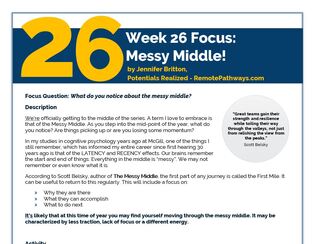 Focus Question: What do you notice about the messy middle? Description We’re officially getting to the middle of the series. A term I love to embrace is that of the Messy Middle. As you step into the mid-point of the year, what do you notice? Are things picking up or are you losing some momentum? In my studies in cognitive psychology years ago at McGill, one of the things I still remember, which has informed my entire career since first hearing 30 years ago is that of the LATENCY and RECENCY effects. Our brains remember the start and end of things. Everything in the middle is “messy”. We may not remember or even know what it is. According to Scott Belsky, author of The Messy Middle, the first part of any journey is called the First Mile. It can be useful to return to this regularly. This will include a focus on:
It’s likely that at this time of year you may find yourself moving through the messy middle. It may be characterized by less traction, lack of focus or a different energy.  Activity What do you notice about the energy and focus of the mid-point of this year? Consider what’s going to help you get traction from the Messy Middle? What’s important to you at this phase? For more on this topic check out: The Monthly Daily Trackers are a great visual tool to view what’s happening in your work and business. What do you notice about the data and trends? There are twelve sets of Monthly Daily Trackers and twelve sets of Monthly Content Trackers in the planner section. Best, Jennifer Jennifer Britton
Co-host of the Remote Pathways Podcast Potentials Realized – Coaching, Training and Consulting Services for remote teams, leaders and professionals Check out the most recent Remote Pathways Podcast Episode, where we explore the people, places and processes of exceptional remote work. You can listen to the latest episode here, or on your favorite podcast player. 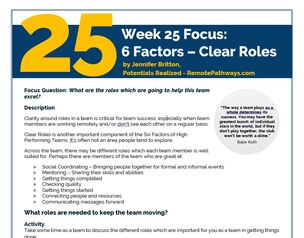 Focus Question: What are the roles which are going to help this team excel? Description Clarity around roles in a team is critical for team success, especially when team members are working remotely and/or don’t see each other on a regular basis. Clear Roles is another important component of the Six Factors of High Performing Teams. It’s often not an area people tend to explore. Across the team, there may be different roles which each team member is well suited for. Perhaps there are members of the team who are great at:
 Activity Take some time as a team to discuss the different roles which are important for you as a team in getting things done. What are the roles which are going to help the team? Who plays what role? How do the roles match with the talents and skills in the team? Are there any roles that are missing? What are the roles which are going to create new things? Get things done? You will also want to explore WHAT key roles are needed by the team? Best wishes, Jennifer Jennifer Britton
Co-host of the Remote Pathways Podcast Potentials Realized – Coaching, Training and Consulting Services for remote teams, leaders and professionals Check out the most recent Remote Pathways Podcast Episode, where we explore the people, places and processes of exceptional remote work. You can listen to the latest episode here, or on your favorite podcast player. 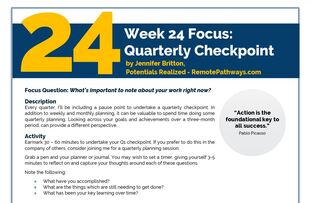 Focus Question: What’s important to note about your work right now? Description Every quarter, I’ll be including a pause point to undertake a quarterly checkpoint. In addition to weekly and monthly planning, it can be valuable to spend time doing some quarterly planning. Looking across your goals and achievements over a three-month period, can provide a different perspective. 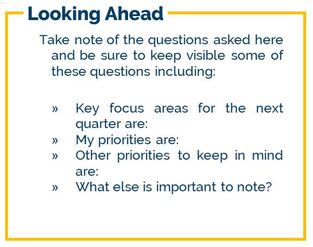 Activity Earmark 30 – 60 minutes to undertake your Q1 checkpoint. If you prefer to do this in the company of others, consider joining me for a quarterly planning session. Grab a pen and your planner or journal. You may wish to set a timer, giving yourself 3-5 minutes to reflect on and capture your thoughts around each of these questions. Note the following:
Over the last three months ask yourself:
Note your programming and/or services deliver. Ask yourself:
For more on this topic check out: PlanDoTrack – Quarterly Planning Section Remote Pathways New Guide – Quarterly Checkpoint (Day 30) Best, Jennifer Jennifer Britton
Co-host of the Remote Pathways Podcast Potentials Realized – Coaching, Training and Consulting Services for remote teams, leaders and professionals Check out the most recent Remote Pathways Podcast Episode, where we explore the people, places and processes of exceptional remote work. You can listen to the latest episode here, or on your favorite podcast player. 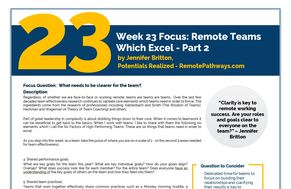 Focus Question: What needs to be clearer for the team? Description Regardless, of whether we are face-to-face or working remote, teams are teams are teams. Over the last few decades team effectiveness research continues to validate core elements which teams need in order to thrive. The ingredients come from the research of professionals including: Katzenbach and Smith (The Wisdom of Teams), Hackman and Wageman (A Theory of Team Coaching) and others. Part of great leadership in complexity is about distilling things down to their core. When it comes to teamwork it can be beneficial to get back to the basics. When I work with teams, I like to share with them the following six elements which I call the Six Factors of High Performing Teams. These are six things that teams need in order to excel. 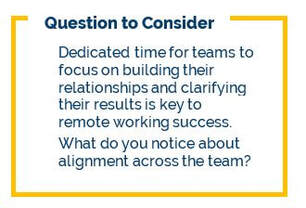 As you step into this week, as a team, take the pulse of where you are on a scale of 1 - 10 the second 3 areas needed for team effectiveness: 4. Shared performance goals What are key goals for the team this year? What are key individual goals? How do your goals align? Overlap? What does success look like for each member? For the entire team? Does everyone have an understanding of the key goals of others on the team and how they feed into them? 5. Shared team practices Teams that work together effectively share common practices such as a Monday morning huddle, a Thursday night out or some other regular event. What practices support your relationships? 6. Clear Roles How do our roles overlap, align and connect? What changes, if any, are needed this year around your roles giving your priorities?  Activity Where are we in each of the Six Factors? What requires attention? For more on this topic check out: Teams365 Team Leader Breakfast Café Call on the Six Factors. Best, Jennifer Jennifer Britton
Co-host of the Remote Pathways Podcast Potentials Realized – Coaching, Training and Consulting Services for remote teams, leaders and professionals Check out the most recent Remote Pathways Podcast Episode, where we explore the people, places and processes of exceptional remote work. You can listen to the latest episode here, or on your favorite podcast player. 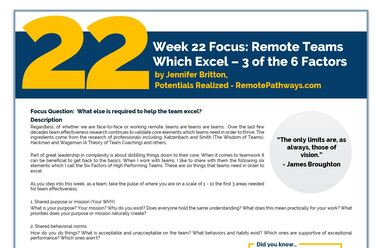 Focus Question: What else is required to help the team excel? Description Regardless, of whether we are face-to-face or working remote, teams are teams are teams. Over the last few decades team effectiveness research continues to validate core elements which teams need in order to thrive. The ingredients come from the research of professionals including: Katzenbach and Smith (The Wisdom of Teams), Hackman and Wageman (A Theory of Team Coaching) and others. Part of great leadership in complexity is about distilling things down to their core. When it comes to teamwork it can be beneficial to get back to the basics. When I work with teams, I like to share with them the following six elements which I call the Six Factors of High Performing Teams. These are six things that teams need in order to excel. 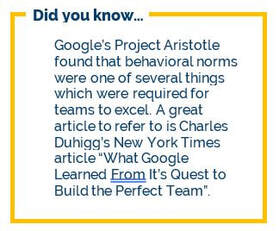 As you step into this week, as a team, take the pulse of where you are on a scale of 1 - 10 the first 3 areas needed for team effectiveness: 1. Shared purpose or mission (Your WHY) What is your purpose? Your mission? Why do you exist? Does everyone hold the same understanding? What does this mean practically for your work? What priorities does your purpose or mission naturally create? 2. Shared behavioral norms How do you do things? What is acceptable and unacceptable on the team? What behaviors and habits exist? Which ones are supportive of exceptional performance? Which ones aren't? 3. Shared commitment What are team members committed to? What will you get done, no matter what? Is there anything that needs to be dropped off the list?  Activity Where are we in each of the Six Factors? What requires attention? For more on this topic check out: Teams365 #1145 – Team Leader Breakfast Series – Six Factors (Audio) Teams365 #1920- Team Development – Revisiting the Six Factors Enjoy your reflections! Jennifer Jennifer Britton
Co-host of the Remote Pathways Podcast Potentials Realized – Coaching, Training and Consulting Services for remote teams, leaders and professionals Check out the most recent Remote Pathways Podcast Episode, where we explore the people, places and processes of exceptional remote work. You can listen to the latest episode here, or on your favorite podcast player. |
AuthorThe Remote Pathways blog follows many of the themes we explore in the Remote Pathways Podcast. This year (2020) we're proud to bring you a 52 week-series for you to follow along throughout the year. Posts are penned by co-host Jennifer Britton, an avid award-winning blogger for many years. Jennifer is the author of five books. Visit her author page on Amazon. Archives
December 2020
Categories
All
|



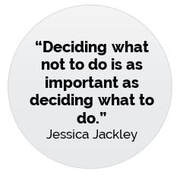


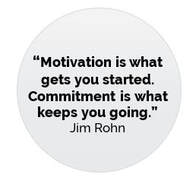
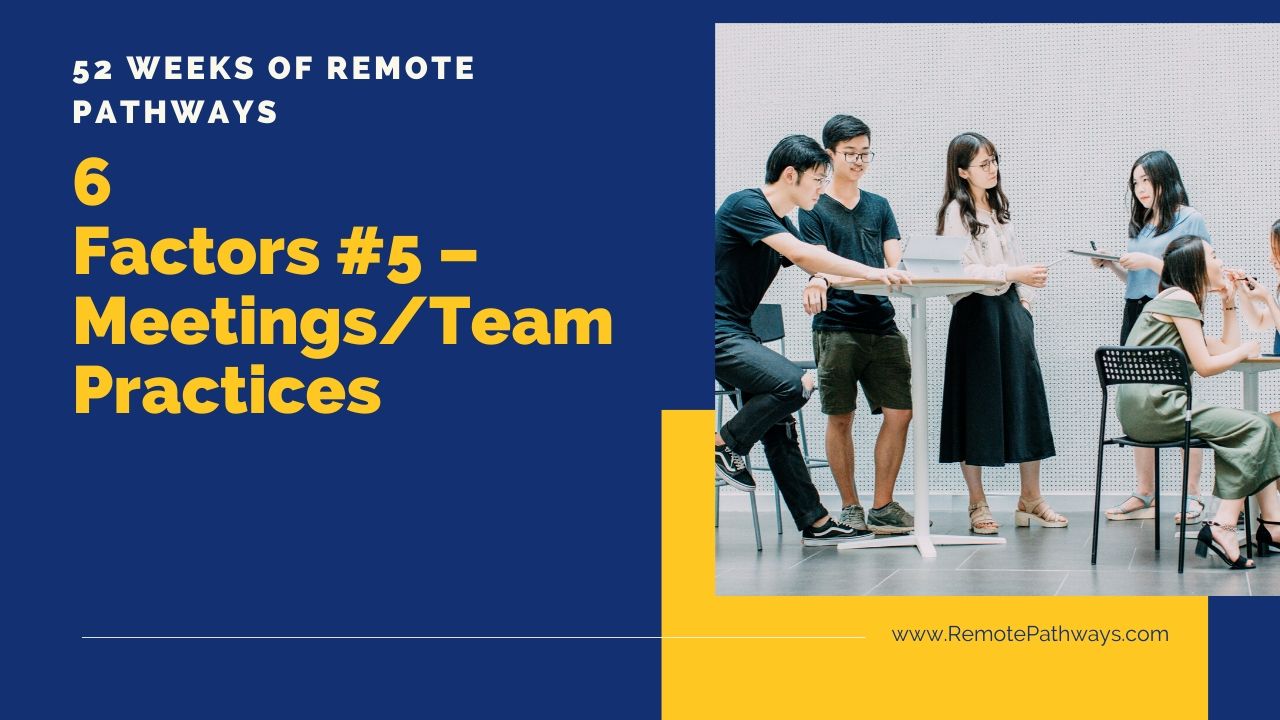
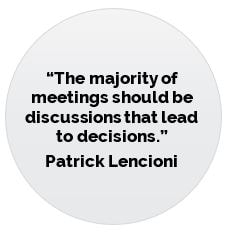

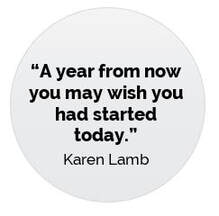

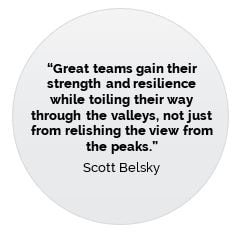

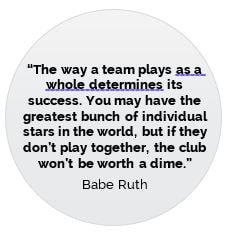

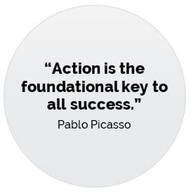

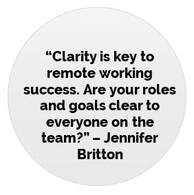

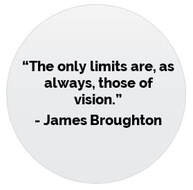
 RSS Feed
RSS Feed